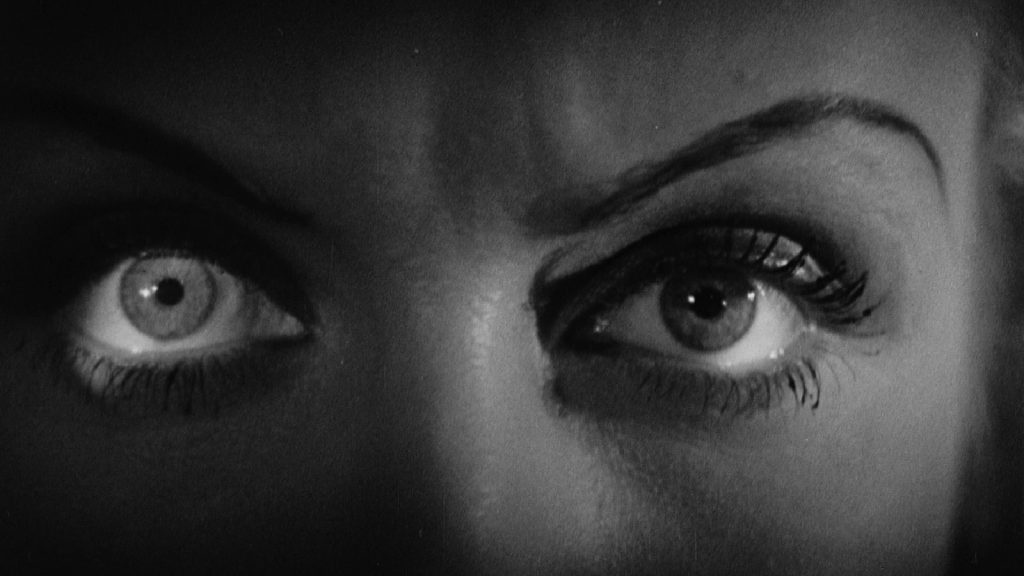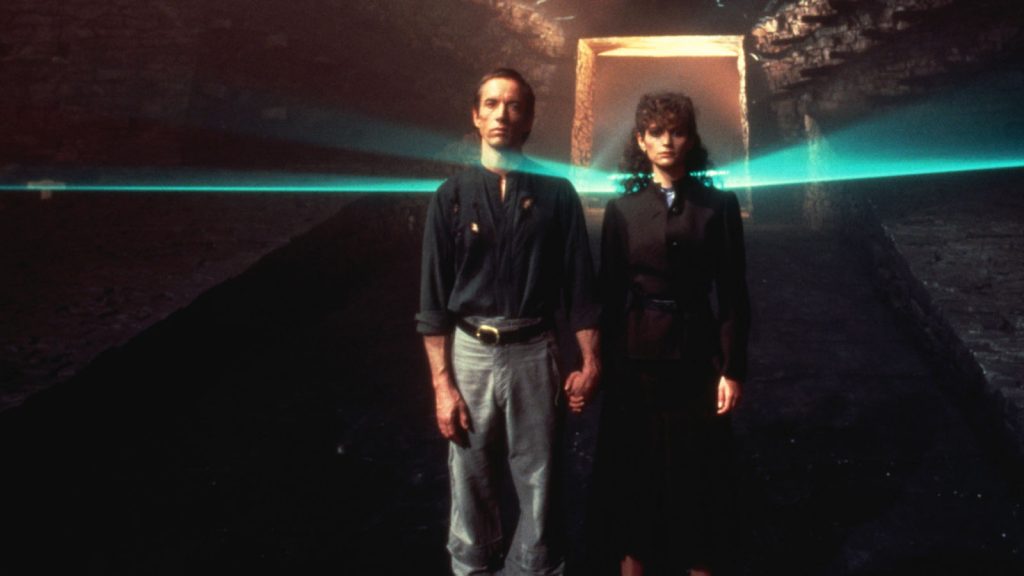
For all of Hammer’s reliance on its tried-and-true monsters, the studio did a fair amount of foraying. Hammer horror could take myriad forms beyond the familiar Dracula, Frankenstein, and Mummy pictures. Among them is 1961’s Cash on Demand, which is both a then-current spin on Charles Dickens’s A Christmas Carol and a nice piece of uneasy Yuletide cinema, with Hammer vet Peter Cushing as the founder of the feast, lest anyone doubt that scares will be served.
Cushing plays Harry Fordyce, the picture’s Scrooge figure, a cold fish of a bank manager who is duped by André Morell’s Colonel Gore Hepburn into believing that his family has been kidnapped and will not be returned safely unless he assists the Colonel in pulling off a robbery. Fordyce is the kind of person who thinks he’ll never need anyone else and thus treats them as if they have no value. That’s a scary way to live because, eventually, everyone requires someone’s help. Fordyce gets it from his staff, who do their jobs well and are even better at exemplifying human decency.
Cushing’s presence sounds the horror note, and death is certainly on the table, or at least we think as much in a film that suggests The Friends of Eddie Coyle from over a decade hence, but resonates mostly as a Hammer one-off. Christmas can be a tense time of year, with the days growing shorter as we feel pressed for time with what we need to get done and also when it comes to our own mortality. There’s a lot of life in the holiday season but also much reckoning as to what one is doing with one’s life, what has passed, what remains, and what can be done in the time that remains.
Director Quentin Lawrence includes just enough holiday sprigs—the odd decoration, some expressed hope for downtime—to conjure the Christmas season. The English liked—and still like—to tell ghost stories during this time of year, and Fordyce—pre-robbery—left a great deal to be desired as a flesh-and-blood human. One great thing about horror is that it can jar us into epiphanies. Within that medium, those epiphanies often come too late—after all, someone is usually about to die. Fordyce finds himself favored with a reprieve—after enduring the double scare of being falsely accused, which was a wallop enough of a nightmare for no less than Alfred Hitchcock—and may go on to have his dancing day yet.
The film’s sets are simple but believable, with the bank standing in for Scrooge’s counting house. Fordyce is haunted—and later humbled—by his past. He’s not been worthy of these people who behave toward him as he never did with them. This is hybrid horror—that is, horror via the thriller and noir genres—which is helped in its cause by our familiarity with the Dickens source material. When you get Scrooge—or someone Scrooge adjacent—it’s difficult not to land in a ghost-centric frame of mind. The movie is light on monsters—in the end, no one is all that terrible here—but we don’t know what we don’t know as the suspense unfolds. Cushing evinces fear, and it wasn’t often that we saw him scared in the Hammer world, even if he was prying open a coffin to stake Dracula through the heart. Turns out a frightened Cushing makes for a frightening Cushing. And while it may not rate as highly as a shindig at old Fezziwig’s, there’s promise of a company Christmas party after the tension finally breaks, which feels well-deserved, for staff and viewers alike. 🩸

is the author of eight books, including the story collection, If You [ ]: Fabula, Fantasy, F**kery, Hope, a 33 1/3 volume on Sam Cooke’s Live at the Harlem Square Club, 1963, Meatheads Say the Realest Things: A Satirical (Short) Novel of the Last Bro, and a book about 1951’s Scrooge as the ultimate horror film. His work has appeared in Harper’s, The Atlantic, Rolling Stone, The New York Times, Vanity Fair, The Daily Beast, Cineaste, Film Comment, Sight and Sound, JazzTimes, The New Yorker, The Guardian, and many other venues. He’s completing a book called And the Skin Was Gone: Essays on Works of Horror Art. His website is colinfleminglit.com, where he maintains the Many Moments More journal, which, at 2.7 million words and counting as of autumn 2023, is the longest sustained work of literature in history.
To love Hammer horror films is to love the look of them and probably also have an abiding affection for the fall, given that it always seems to be autumn in the world of Hammer.
BY COLIN FLEMING | October 28, 2024
Just about everyone loves Halloween—and if someone tells you they don’t, you might wish to keep your distance—but few people are aware of the spring’s variant on All Hallow’s Eve.
BY COLIN FLEMING | April 30, 2024
It’s quite likely that my first taste of narrative horror was provided by Tales from the Crypt, the luridly tongue-in-cheek anthology series that ran from 1989-96 on HBO.
BY STEVEN MEARS | December 22, 2024

This pre-Code offering packs a lot of story into its typically brisk running time, with several plot threads weaving together a (not always successful) tapestry of spooky and criminal doings.
READ MORE >
BY ANN OLSSON | Month 00, 2021

In what could be the fastest-resulting rape revenge movie, a drunken lout brutally forces himself on Ida, the young woman who doesn't return his affections, during a party over Labor Day.
READ MORE >
BY LAURA KERN | Month 00, 2021

Beast is a lot of movies in one package - fractured fairy tale, belated-coming-of-age story, psychological drama, regional horror film - but above all it's a calling card for its leading lady, Jessie Buckley.
READ MORE >
BY LAURA KERN | Month 00, 2021